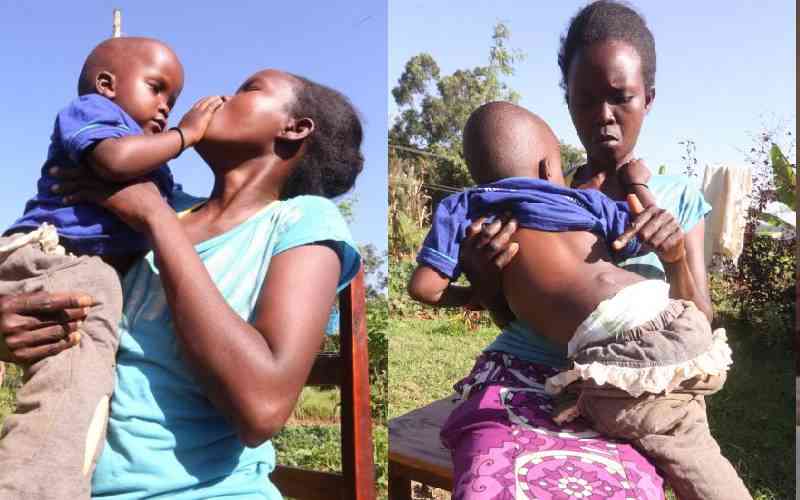
Three-year-old Floyce Oyier struggles to stand on her feet. Unlike children of her age, she still crawls. She is unstable and her legs are feeble.
Her mother, Davin Oyundi, doesn't mind carrying Floyce around and supporting her in all ways possible.
She slowly crawls on the living room floor and hauls herself against a couch to her mother's joy, who says she did not expect her child to do any of this.
Just two weeks after birth, Floyce underwent major surgery to correct a spinal defect. She was born when her spine had not fully developed, a condition known as Spina Bifida.
When Davina went into labour it was in the middle of the night. Living far away from a health facility forced her to run to a traditional birth attendant who helped her deliver her third born child, Floyce.
Unlike her other two children, Floyce had developed a swelling at the bottom of her back, a tuft that medics described as protruding spinal cord tissue.
"I was nervous and worried, the birth attendant told me that the baby has a serious problem that needed urgent medical care," Davina recalls.
In the morning, Davina went to the referral hospital upon which she was referred to Kijabe hospital for correctional surgery as the clump was leaking.
Dedan Ongonga, a paediatric surgeon at Jaramogi Oginga Odinga Teaching and Referral Hospital explains that the condition occurs due to incomplete closing of the spine and the membranes around the spinal cord during early development in pregnancy also known as neural tube defect.
This occurs when the membrane that is supposed to enclose the spinal code does not close and because the tube is open, it gets filled with fluid.
"It is commonly found in the lower part of the back but it can occur anywhere from the head going down," Dr Ongonga explains.
About 2,000 children are born with the disorder in the US every year.
The severity of the problem in Kenya is not well documented, but medics at Jaromogi Odinga hospital say they attend to an about two children born with the condition every a month as a majority of such surgeries are carried out at Kijabe Hospital.
Ongonga says apart from the swelling on the back, patients develop stool and urine incontinence, where they are unable to control the two function, and this later develops to urine retention.
In addition to weakness if the limbs, the patient could also become develop paralysis.
"When a patient presents with spina bifida, we try to rule out if a they also have hydrocephalus. If a child has both hydrocephalus and spina bifida, we cannot repair the spine before sorting out hydrocephalus," the medic stated.
Only a small percentage of patients that have spina bifida do not also present with hydrocephalus.
The condition can be caused by lack of folic acid in a pregnant woman's diet. However, the causes of a number of spina bifida cases have never been identified.
Most pregnancies are categorised as normal, whereby a mother may carry the baby and even deliver it without even realising there's problem. This is particularly so if the woman was not going for antenatal clinics.
An obstetric ultrasound can detect spina bifida while the baby is still in the womb since the swelling at the back can be visible.
If it's picked up early then surgery can be done immediately the baby is born.
"There are membranes that are used to repair the undeveloped or open spine by getting a normal skin to cover it," Ongonga said.
However, Davin states throughout her pregnancy and even after an ultrasound was done, she medics attending to her assured her that the baby was alright and there was nothing to worry about.
"The swelling was so big and I wonder how it was never detected during the antenatal clinics," Davin complains.
Dr Ongonga notes that the ultrasound can detect the swelling but states that there are concealed forms of bifida which may not be easily detected.
"Even when detected very little can be done but wait until the child is born in order to carry out a correctional surgery," he says.
Management of spinal bifida is lifelong and it all depends on the severity of the neurological defects a patient undergoes before the surgery as some damages to the nerve are irreversible.
The surgery is free in public hospitals and costs up to Sh200,000 in private facilities. What is noteworthy is that many patients come from low-income earning families due to deficiency of folic acids.
After the surgery, patients must undergo physiotherapy and occupational therapy to help strengthen the muscles. Some develop clubfoot and will need orthopedic attention.
Today baby Floyce undergoes physiotherapy sessions which have contributed to her feeble movements.
Sometimes, surgery is not always done immediately after birth and children are given time to grow for about six months to a year before the surgery is carried out.
Patients have to keep the wound very sterile as an infection on the site could lead to meningitis.
In adults, the condition occurs following trauma. This is corrected with surgery.
 The Standard Group Plc is a multi-media organization with investments in media
platforms spanning newspaper print
operations, television, radio broadcasting, digital and online services. The
Standard Group is recognized as a
leading multi-media house in Kenya with a key influence in matters of national and
international interest.
The Standard Group Plc is a multi-media organization with investments in media
platforms spanning newspaper print
operations, television, radio broadcasting, digital and online services. The
Standard Group is recognized as a
leading multi-media house in Kenya with a key influence in matters of national and
international interest.
